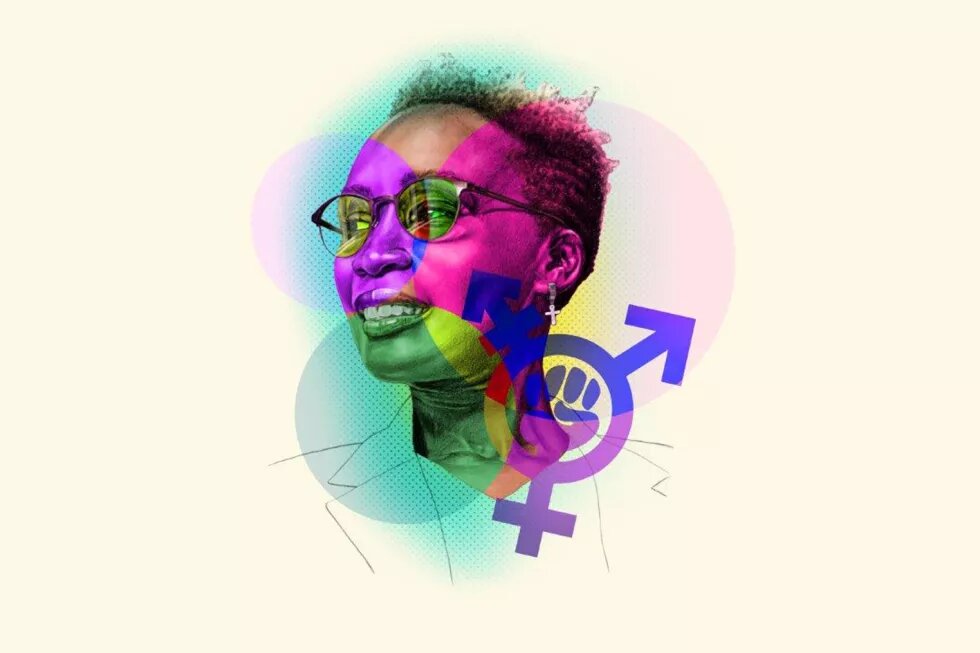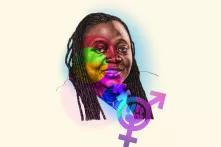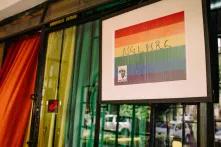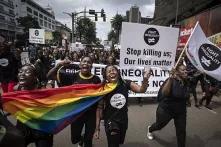Queer feminism allows us to understand that patriarchy harms all of us and only an intersectional approach enables collective liberation and working together in solidarity. Queer resistance can also be fun - and sometimes a dandy outfit is enough to make patriarchy shake. We talked to Yvee Oduor about activism and mobilization of genderqueer people in Kenya.

The interview was conducted by Claudia Simons, Senior Programme Manager in the Africa Division at Heinrich-Böll-Foundation.
Claudia: What is queer feminism for you?
Yvee: To me, queer feminism radically challenges patriarchy while centring queerness and queer people, that is, we radically and actively tackle issues of transphobia, homophobia, bi-phobia, and racism, even within the feminist movement. Queer feminism to me also goes beyond the textbook definition of what feminism is, because we realise that gender is a spectrum and far more than just men and women. By realising that this is the case, we include gender non-conforming folks – people who do not necessarily identify within the binaries of gender – and radically centre them in our feminism. Queer feminism to me is also realising that patriarchy is harming all of us; all of us are in this together. And if we approach this intersectionally and we strive for collective liberation and work together in solidarity, that is the way we can smash the patriarchy. And, yeah… Queer feminism to me is a feminism that is sex-positive in its approach to liberating people of all genders.
Claudia: It sounds like queer feminism for you is not a theory but something very hands-on…
Yvee: Absolutely! It is speaking truth to power by challenging systems of oppression. For me personally it all started by saying, “I deserve better.” I deserve better than what I’m receiving right now in my country, in my world, in my work environment, in my family setup, in my society. I deserve better, and I am doing something about it. It’s wanting change and being “bold enough” to go out there and create it for yourself. So, for me and in my line of work and in the way I live my life, I feel like activism is resisting the things that you’ve been told about yourself, and wanting to find them out and wanting a better world. It’s creating a better world not just for me, but also for people like me – past and present and future. I want a queer baby in Kenya to never have to go through the things that I had to just to find a little shred of dignity.
Claudia: What role do alliances – across identity groups, racial divides, countries, continents – play in queer feminist activism? Are alliances important to you?
Yvee: Yes! And thanks for bringing that up. As queer feminists and activists, we are not always in spaces that could bring change for us. Solidarity for me is having people in spaces that we cannot access, speaking the same language as us, and trying to open doors so other people, like me, can access those spaces. Solidarity to me looks like people listening and people actively trying to voice what we are saying, especially when we are not able to.
It is a lot of work. We can’t do all this by ourselves. When I got into my 30s and was overwhelmed by all the work that needs to be done, I realised that I really do not have to do it all by myself. If all of us come together, if we have solidarity across identities, especially race, then people who are more privileged, people who have more access are amplifying our voices. That’s my Utopia, that’s my ideal form of activism. That is how to get work done! (laughs)
Claudia: The Black Lives Matter movement and the resistance to police violence in the United States and across the globe is all over the media at the moment, spurring some sort of “white awakening” to racism. But is that already some sort of solidarity, or is it just some superficial awareness that will have no consequences? Where do you see the challenges and opportunities in terms of queer feminist activism in the current situation?
Yvee: From where we started ages ago to where we are at right now, there has been a lot of improvement and a lot of work done by our allies and our partners. But there is definitely more work to be done. I’m glad that in 2020 white people are realising that there is actually a problem called racism. But that does not mean that people have not been screaming this at the top of their voices for centuries. It’s just that finally people are paying attention, which is a good thing. I’m just glad that it’s happening and I’m hoping that it’s not just a phase.
I also hope that people realise that all oppression is connected. People who are racist tend to also be homophobic, to be sexist, and so on. These things are layered. If people can apply the lens of inclusivity around race, we could do the same with gender, with queerness, with class. During the Black Lives Matter conversation, we saw that during the same awakening of racial inequality and racial injustice, women are still being treated awfully; women are still being murdered during the same weeks, so it cannot be just one conversation. This is a layered conversation about oppression in general. And if we approach it that way, if we approach dismantling oppressive systems in general, then I think liberation for all people is possible.
Claudia: Who is your inspiration, or your role model, in your everyday activism? What keeps you getting out of the bed in the morning?
Yvee: This has changed a lot over time. If you had asked me this question two or five years ago, I’m sure it would have been a completely different response. When I started my activism, of course I looked to Black women who were challenging the status quo, and I drew a lot of inspiration from them. If I was to drop one name, I would definitely say Angela Davis. The way she has radically lived her life is something I can only aspire to.
But inspiration for me not only comes from people, but from the Utopia world that I envision. Right now where I am in life, I feel like my inspiration really is “wanting better”. I have got into a place where I know my worth, I know what I deserve as a person. So when I look at people like me, I know who we are, I know what we are worth and what we deserve, and that inspires me to do my part to make this real, not just for my personal gain but for collective gain for queer Black people in this continent, and in the world in general. That motivates me and keeps me going, even on days when I feel like things are not moving, when life is becoming hard, or when we are facing a lot of resistance and obstacles, or when something really demoralising happens. When I think of this Utopia world – where queerness is just part of everyday life and where children are not being sent away from home and are not going through all these horrible things – I feel motivated to get to work, to continue pushing. Take, for example, my nephew. I do not want them to go through any of the things I had to go through. When you see a child that is a bit different and you know what is in store for them, that is motivation and inspiration enough to want to fix the world.
Claudia: Raising children as queer parents and being parental allies to queer children and youth is in itself subversive politics…
Yvee (laughing): Exactly...
Claudia: Tell me a little bit about the political, social, economic, and cultural context that shapes your activism and the strategies you apply in that context.
Yvee: I live in a country and in a context generally in East Africa, where the political class or elite have no regard for the rule of law. For example, in Kenya and South Africa, we have really good constitutions – they should be enough to protect me as a minority. But no one cares what the constitution says. That is why, as minorities, we are constantly going to court. They brand us litigious, but it’s because we really feel that we have very little choice.
Another thing is religion. It’s the hangover from colonisation that we are currently dealing with. Personally, I don’t even know how we are going to jump over the huge hurdle that is religion, because it’s been ingrained in the fabric of our society, especially older people.
So, we have a situation where religion is strong – Christianity and Islam in this case – and people don’t give regard to the rule of law. All of this is cemented by patriarchy. That is really a difficult context to navigate. And what comes out of all this is poverty, violence, and people’s rights being violated right, left, and centre.
In the region, people in power also copy-paste from each other in their repression. When the anti-homosexuality bill happened in Uganda years ago, there were immediately people in Kenya trying to implement the same. Therefore, we do a lot of solidarity work, even outside of Kenya and East Africa. We connect to queer struggles in South Africa, we look towards India when we try to find litigation strategies, we partner with a lot of different queers all around the world just to ensure that we’re not missing something. Often, you’ll see that the cultural context, the political context are similar in certain ways. So, we borrow a lot from each other.
Working in a context like this requires a lot of strategy, planning, and plotting behind closed doors. We’ve got into a place where we are working like spies – things can’t leave the room, we can’t record this, don’t take pictures – because you don’t even know if you’ve been infiltrated.
Claudia: Your strategies include a lot of secrecy, yet you and many other queer East African activists are also very outspoken, mostly in social media despite, repressive contexts. This being outspoken, being in social media, being very visible, that also makes everyone very vulnerable. Is that a strategy you chose purposefully?
Yvee: Yeah. I’ll speak specifically to Kenya for this one. When we started organising our queer activism, we were very much focussed on changing policies and the law. But over a period of time, we came to the realisation that if people’s hearts and minds are not open to change or to inclusivity or to non-violence, then all the laws in this world will not protect you. So we applied a multi-layered approach to decriminalisation. We said, “It’s not just about litigation. We also need to put all these other things in place.”
And at the time, when I came into the movement as a young person, I felt like the movement was closeted. I could look across the other parts of the world and of Africa and there were people who were out and loud and proud, but not so in Kenya. It got to a point where we just got tired of all this hiding. I remember we would go into spaces and would be in conversation with government and say, “We are representatives of a group,” and they’re like, “Who are these queer people? How come we never see them?” Partly because of this, we became more visible and got out saying, “We are queer and we are here, now give us our Human Rights!” Coming out wasn’t even a collective, “Let’s all hold hands and go out.” People were just completely fed up with this ignorance. There was a time a political leader would confidently stand up and say, “We don’t have queers in Kenya or in Africa.” We’ve moved past that. Now they still don’t like us, but they also cannot ignore us anymore.
Claudia: In the United States and many European countries, being queer is often associated with being visibly out, partying, consuming. Take the Christopher Street Day as an example: Its history is one of a largely Black trans* resistance to police violence, a fight of a community that continues to live in danger and for whom visibility is often associated with violence. However, the CSD in many Western countries has become a marketing party. Being out and visible can be very important, and at the same time there are so many people who really just fight to survive.
Yvee: Exactly. When I talk to younger queers, I tell them to take it slow. Be out at your own time, when you feel safe, when your environment allows. Don’t just do it because you see that I did it. It’s a tight balance and the coming out debate – the visibility vs. safety discussion – has been a fight here, too.
I stand on the side of visibility and coming out, but I say this knowingly, and I call out all of my privileges that have allowed me to do that. I do have certain privileges that allow me to be very visible, to be out and proud and not face imminent threat every single minute of my life. That is not the reality for every queer person.
Claudia: Do you have any preferred forum of mobilisation or activism?
Yvee: I think there are two things. The first one: I feel the internet was, and continues to be, the best thing that ever happened to organisers. The way you could literally just bring together people from all over without putting them at risk, especially during Covid.
But outside of that, what made me completely radical and what grounded my feminism work particularly was having women* and gender-queer spaces only. So even within the queer minority movement, when we had those safe spaces that didn’t allow men in, this is where we had the most radical conversations. That is where we had conversations that changed my belief systems, that helped me unlearn things I had been socialised to think, where I could relearn and grow in my feminism. It’s important to have those women* and gender-queer-only spaces so that we can continue to have these conversations and strategies about smashing the patriarchy without a lot of interference.
Claudia: You are not only a very outspoken activist, but also a dapper fashion icon. Is that just your personal style, or do you see a role for style and fashion in queer feminist activism?
Yvee: It’s both. As a person, I generally like looking good. It’s always been part of my identity, to be constantly fashion-forward. But when I came out as non-binary and I struggled a bit with gender dysphoria, wearing a suit made me feel a certain way. The confidence when I looked into the mirror… I saw the person that I felt I was on the inside, that people looking at me couldn’t see or sometimes don’t want to see. So wearing a three-piece suit is just one way of affirming myself and my gender identity.
But it is also reclaiming our masculinity. Who decided that masculinity is only a privilege for men? Interestingly, when people see someone masculine who they think is not welcome to the table of masculinity, they feel threatened. It makes me laugh! What is it about me wearing a three-piece suit that threatens you so much? So me wearing a suit is also a challenge to the system, and it’s continuously pissing off the patriarchy. And if you can do that and look good and feel good about yourself in that process, I feel like it’s a win for everyone.
Claudia: It’s funny to see how strong the patriarchic system seems to be, but how easily it’s shaken by very banal things…
Yvee: (laughing) It’s so fragile. I think you asked me, if I wasn’t an activist, what would I be doing? Honestly, at this point, I’d just be creating a clothing line for non-gender-conforming people or androgynous people to just push back and challenge what it really means to wear clothes for yourself and not for what society has prescribed.
Claudia: What would be the one thing you would recommend to young queer feminists, other activists, and generally young people in Kenya, in Africa, but also anywhere in the world?
Yvee: The one thing I wish somebody told me when I was 19 and starting on this wild course is to take care of myself. This work can consume you. It’s OK to take a break. It’s OK to take a step back. It’s OK to take care of yourself, and at times just check out and do things you love just for yourself. Especially in the context that I come from, lack of rest and suffering is glorified: The person who doesn’t rest, even if it’s harming them, is seen to be productive. This stems from capitalism really, and that has been the culture for a long time. So when I started this work, I put my whole life, my whole self into it and it almost consumed me.
So to young activists, I’d say: Yes, let’s do the work, it must be done, we’re here to try and make this place a better one, and that’s really admirable. But don’t forget to take care of yourself, to take time off and to create a support system. Take care of your mental health, your body, and take care of each other. That’s the way you can be activists and be fearsome at the forefront for a long time.
Claudia: Just as Audre Lorde reminded us, that self-care is political warfare…
Yvee: Exactly. It really is. And I’m glad that these conversations are being had now in queer spaces. But this was not the case a few years ago. We were all about just pushing and going and going and going. So, yeah. Just to sound like a broken record, but please let’s take care of ourselves, and especially during these times where life is a bit uncertain and the future is a bit uncertain and we’ve had to go through so much isolation. Things have really changed in our lives. It’s good to just take a bit of time and breathe.
This interview was first published by HBS.


